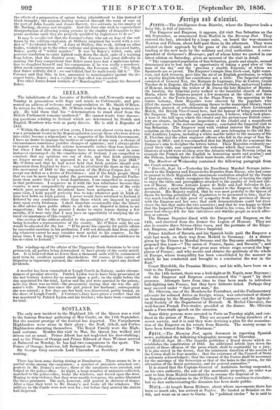IRELAND.
The inhabitants of the baronies of Rathkeale and Newcastle went on Sunday in processions with flags and music to Cahirmoyle, and pre- sented an address of welcome and congratulation to Mr. Smith O'Brien. In return for this courtesy, Mr. O'Brien read to them a long written re- ply. He told them that his " determination to stand aloof from the British Parliament remains unaltered." He cannot waste time discuss- ing questions relating to Ireland which are determined by Scotch and English Members who vote as party directs. He is still a Repealer of 1843.
" Within the short space of ten years, I have seen almost every man who was a prominent leader in the Repeal agitation (except those who were driven into exile) become a stipendiary or a supporter of the British Government. I have no desire to impugn the motives or conduct of any man : a change of circumstances sometimes justifies changes of opinions ; and I always prefer to impute even to doubtful actions honourable rather than base motives : but when I find that these changes have been sanctioned—and in some instances encouraged—by the constituencies of Ireland, I am compelled to conclude that my ophuons are out of date, and that Irish patriotism no longer means what it appeared to me at Tara in the year 1843." Mr. O'Brien said that he had never held that Irish patriots should seek separation from England by force ; and he attributed his share in the abor- tive movement of 1848 to the suspension of the Habeas Corpus Act. "I accept our defeat as a decree of Providence ; and if the Irish people think that we can be more happy under the government of the Imperial Parlia- ment than under that of a local Legislature, I am compelled to acquiesce in that preference. I acquiesce in it with the less reluctance because this country is now comparatively prosperous, and because some of the evils
which gave occasion for discontent have been mitigated At the same time, I hold myself perfectly free to take whatever part in Irish af- fairs best befits an Irish patriot. I never would have returned to Ireland if fettered by any conditions other than those which are imposed by social duty upon every Irishman. I shall therefore occasionally take the liberty to offer advice upon public affairs to all who are disposed to listen to my suggestions ; but for the present I desire to enjoy repose during a few months, if it were only that I may have an opportunity of studying the al- tered circumstances of this country."
One section of the address alluded to the possibility of Mr. O'Brien's son being hereafter a representative of the county. Mr. O'Brien said, his son would be educated for the bar. " If he prove his capacity for public affairs by successful exertion in his profession, I will not dissuade him from adopt- ing whatever career he may consider most useful to his country. In the mean time, I am happy to inform you that I place unlimited confidence in his devotion to Ireland."
The winding-up of the affairs of the Tipperary Bank threatens to be very protracted, all parties being determined to have plenty of the costly article law. It is believed that no fewer than a thousand suits will be commenced next term by creditors against shareholders. Of course, if this career of litigation is vigorously pursued, the creditors need not expect any further dividends.
A murder has been committed at Lough Corrib in Galway, under circum- stances of peculiar atrocity. Patrick Lydon was to have been prosecuted at the last Galway Assizes for an assault upon a girl ; on the night before the day appointed for the trial Lydon and the girl were married in the prison; next day there was no trial—the prosecutrix stating that she was the pri- soner's wife. Some time since the girl joined her husband ; subsequently she was missed ; a few days ago her body was discovered, partly buried, on the shore of Lough Corrib. A Coroner's Jury have given a verdict that she 'was murdered by Patrick Lydon and his brother ; who have been committed for trial.


























 Previous page
Previous page